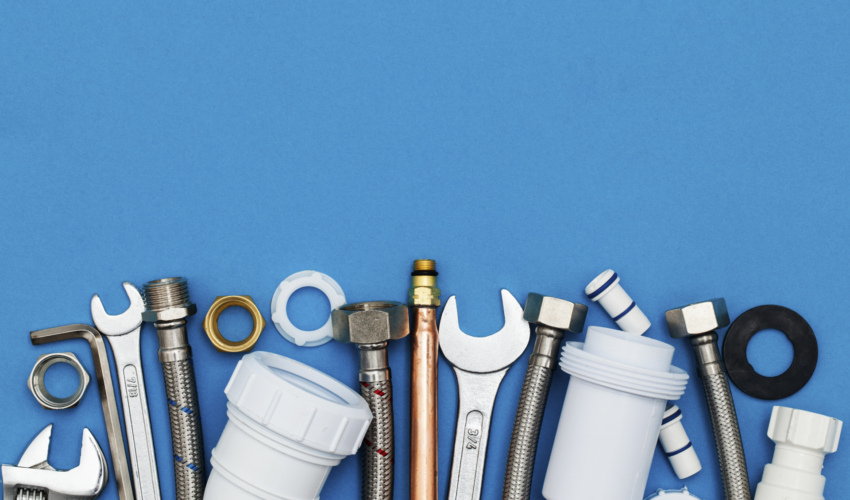From flushing a water heater to repairing a broken pipe, the average household regularly encounters plumbing-related repairs. With a seemingly endless supply of how-to videos and DIY content readily available, it can be tempting to skip the service call and simply tackle these projects yourself—but which ones are really in your wheelhouse?
Below, we discuss a few common plumbing repairs and indicate whether they’re DIY-friendly or require a professional’s expertise.
Replacing a Showerhead – Easy
This is one of the simplest DIY repairs a homeowner can do—you’ll just need to unscrew the old showerhead and screw the new one in. The biggest mistake you can make is scratching the new hardware, so be careful!
Flushing a Water Heater – Easy
Flushing your water heater regularly is part of routine maintenance—but fortunately, any homeowner can learn how to do it. When North East flushes your tank, we attach a full port ball valve on the boiler drain so that homeowners can then flush it themselves in the future. If you’re interested in learning how, we’d be happy to show you during our next flushing visit.
Unclogging a Drain – Average
Drain clogs caused by hair, food scraps or even grease can be a regularly occurring nuisance in your home. But breaking up minor clogs doesn’t usually require a plumber’s visit—a plunger and hand auger should be enough to unclog single fixtures like sinks, showers, and toilets.
If you can’t unclog a drain by using these tools or if the entire house is affected by a clog, then it’s time to call the plumber. Plumbers have more serious equipment, including long augers, flexible video cameras, and other tools that can quickly identify and remove clogs, whether they’re in your home’s drain piping or in the sewer line outside.
Repairing a Leaky Faucet – Average
Repairing a leaky faucet can require specialized tools that not all homeowners may have on hand. Fortunately, if you’re up for the task, your local hardware store will likely have the tools you need for most faucets.
If you’re repairing a generic faucet from a big-box store, you’re unlikely to do much damage by trying your hand at repairs. Repairing old or antique faucets can be more of a challenge for the average homeowner, but can also be done with the right tools and parts. If the faucet continues to leak even after you’ve worked on it, call the plumber.
Installing a Water Softener – Difficult
In most areas, installing a new water softener requires a permit.
If your home already has a water softener and you’re familiar with the hand tools needed to turn the water supply off and on, you may be able to tackle this yourself. However, running into problems—like a leaky water shutoff valve, unsecured piping, or unfamiliar connections—can quickly turn this job into one that requires a professional. For all but the most adventurous DIYers, this project is best handled by a plumber.
Replacing a Toilet – Difficult
It’s possible to replace a toilet on your own, but there are a few big caveats.
First, a plumber will be able to set the toilet in a way that allows the wax ring to seal better and last longer. Installing a toilet yourself could mean having to reinstall it again soon.
Another difficulty may arise if you discover that the flange needs replacing—this type of repair is out of most homeowners’ leagues. Even worse, if you can’t tell the flange is bad and install the new toilet anyway, you may find yourself soon calling a plumber to redo the repair. If the toilet is upstairs, a faulty flange will cause toilet water to leak onto the downstairs ceiling, resulting in even more problems.
Ultimately, unless you’re certain this is a complication-free repair, it’s better left to the professionals.
Fixing a Broken Pipe – Professional
Finding a leak and repairing a pipe can be a tremendous challenge for an amateur. Major pipe repairs often require permits. On top of that, the water to your home will need to be turned off until the repair is completed, so speed and accuracy are of the essence.
But fixing leaky pipes is the quintessential plumbing repair, and plumbers are great at it! Plumbers have specialized training in locating and repairing leaking pipes quickly and thoroughly to prevent future issues. They can also easily identify the type of pipe, which can dictate the type of repair. Letting the professionals handle this type of repair is your best option.
Installing a Water Heater – Professional
Installing a water heater can present several potential complications homeowners may want to avoid. Installing a natural gas water heater should always be performed by a professional due to the risk of a gas leak.
Although many major retailers that sell water heaters offer installation services, it’s a better idea to skip the middleman and hire a plumber yourself. These installation services are performed by subcontractors, and the retailer will disclaim any responsibility for damage or improper installation. Instead, call a plumber you trust.
DIYers: Proceed With Caution
Though some repairs can be easily handled with a few basic tools, DIYing any plumbing repair carries the risk of creating bigger issues or injuring yourself. When in doubt, call North East Air Conditioning, Heating, and Plumbing. Our experienced plumbing professionals will handle your job quickly and effectively, giving you peace of mind that your repair has been done right the first time.


